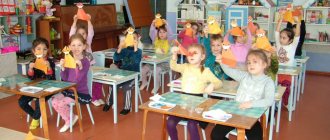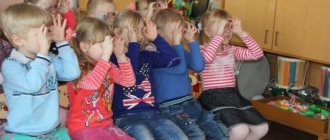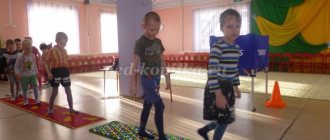Russian folk games for speech development. Senior group
Russian folk games for speech development
What are you doing? (Russian folk game) Activate verbs and verb forms in speech that denote professional actions. The game is played outside. The leader assigns jobs to all the players sitting in the circle: cook dinner, bake bread, repair a car, sew, knit, etc. Each participant digs a hole for himself, sits down next to him, takes a stick and twirls it in the hole. The leader in the middle of the circle also twirls the stick in the hole. He assigns everyone some common task, for example, he says: “Bake bread, everyone!” And everyone starts twirling their chopsticks in the hole and repeating loudly: “I’m baking bread, I’m baking bread.” At this time, the presenter unexpectedly turns to someone with the question: “What are you doing?” The person asked must immediately name the work assigned to him personally, for example: “I sew a dress.” If he makes a mistake and names the general one (“I’m baking bread”) or hesitates, he changes places with the leader. Mail (Russian folk game) Correlate the verb with the action it denotes. The leader is selected (appointed by lot). The rest of the players think of one action. A dialogue begins between him and the rest of the game participants. - Ding, ding, ding! - Who's there? - Mail. - Where? — From Ryazan (any city). - What are they doing there? - They dance (sing, laugh, swim, fly, jump, croak, quack, dive, drum, knock, wash, etc.). All players must depict the named action. Anyone who didn’t have time or portrayed it incorrectly becomes the driver. King (Russian folk game) Correlate the movement with a word denoting a profession. One of the players becomes a king at will. The rest are considered employees. The king sits down in a certain place, and the workers step aside and agree on what work they will be hired for by the king. Having agreed, they come up and say: Hello, king! - Hello! - the king answers. - Do you need workers? - Needed. - Which? Children begin to use expressive movements to portray people of different professions (sawyer, lumberjack, plowman, digger, seamstress, cook, laundress, etc.). The king must say what everyone is doing, and if he immediately names everything correctly, then the workers run away to a pre-designated place. The king catches them, and whoever catches him becomes king, while the rest go back to agree on the work. If the king names what is shown incorrectly, the children repeat the movements until he finally identifies all the works correctly. The king can catch the players only until they reach the designated place. If he doesn't catch anyone, he remains king for the next game. The main thing in this game is to choose a job that is difficult to guess, and thus force the king to play his role longer. Kuzovok (Russian folk game) Form diminutive names. The children sit down to play. One of them puts a basket on the table and says to his neighbor: Here’s a box for you, Put what’s ok in it, If you say anything, you’ll give the deposit. Children take turns naming words with an accent ending in -ok, for example: “I will put a ball in the box (lock, knot, box, boot, shoe, stocking, iron, collar, sugar, bag, leaf, petal, bun, cap, comb and so on.). Words should not be repeated. If someone makes a mistake, they put the deposit in the basket. At the end of the game, pledges are played out: the basket is covered with a scarf, and one of the children takes out the pledges one by one, after asking: “Whose pledge will be taken out, what should he do?” Children take turns assigning ransom to each pledge, for example, jumping around the room on one leg or asking a riddle or singing a song. Guess the nickname Choose words to describe the toy characters. Children come to visit with toys, for example, a fox and a puppy. They offer to guess their names. The adult explains that the guests should have names so that they can immediately guess who is who. He asks: “What do you guys think, what is the little fox’s name?” The little fox is cunning and has a fluffy tail. He is red, almost orange, like the sun. Did you guess it? What can you call a little fox? Fox, is your name Ryzhik? When all the guesses have been made, the adult prompts on behalf of the little fox: “My name is...” and chooses the most interesting nickname. The puppy is characterized similarly. He is cheerful, funny, jumps well, fast, black as coal. The children are looking for a name for the puppy. The puppy and the fox offer riddles to the children. What is the name of their gnome friend (squirrel, bunny, etc.), who is shy about everything? Who loves to sleep? Always grumpy? Does he read endlessly? Loves cleanliness?
We recommend watching:
Speech games for children Speech development in children. Tips for parents Games for developing the speech of preschoolers through improvisation The game is an exercise in the correct use of the verb want for children 5-6 years old
Similar articles:
Games for the development of speech breathing in the middle and senior groups
Speech development in children 3-4 years old with developmental disabilities based on Suteev’s fairy tales
Games for the development of attention and speech in children 4-6 years old
Letter games for children 4-6 years old
Tasks in pictures for speech development for children 3-5 years old




